#especially not a bi woman of colour who made important history
Explore tagged Tumblr posts
Text
Me @ everyone who harasses Loreen

#eurovision#eurovision 2023#esc#esc 2023#loreen#käärijä#learn to accept results#and even more importantly#don't fucking harass people#especially not a bi woman of colour who made important history#eurovision sweden#esc sweden
71 notes
·
View notes
Text
idk, i'm just gonna introduce myself rq.
hello!

call me rigby. that's not my name, not even my last name. but i like the sound of it. i am currently 21 years old, a bi woman and in a relationship with a gamer dude who's over 6ft. (shoutout to you, my lil skyscraper looking ass boy) i'm half asian, half white. i like cats, pastel colours (especially green, pink, purple and blue), art, flowers, people who know when to shut tf up, dogs, clouds, the avatar universe, queer and neurodivergent shit and silly people. i read, draw, dissociate. my hidden talent is that i'm good at mimicking elmo's voice. pls be gentle with me or i will scream.
i also have an oc that literally doesn't stop living in my head rent-free for like... years now. her name is hanami ikarashi. i drew some pictures of her, wait a sec.
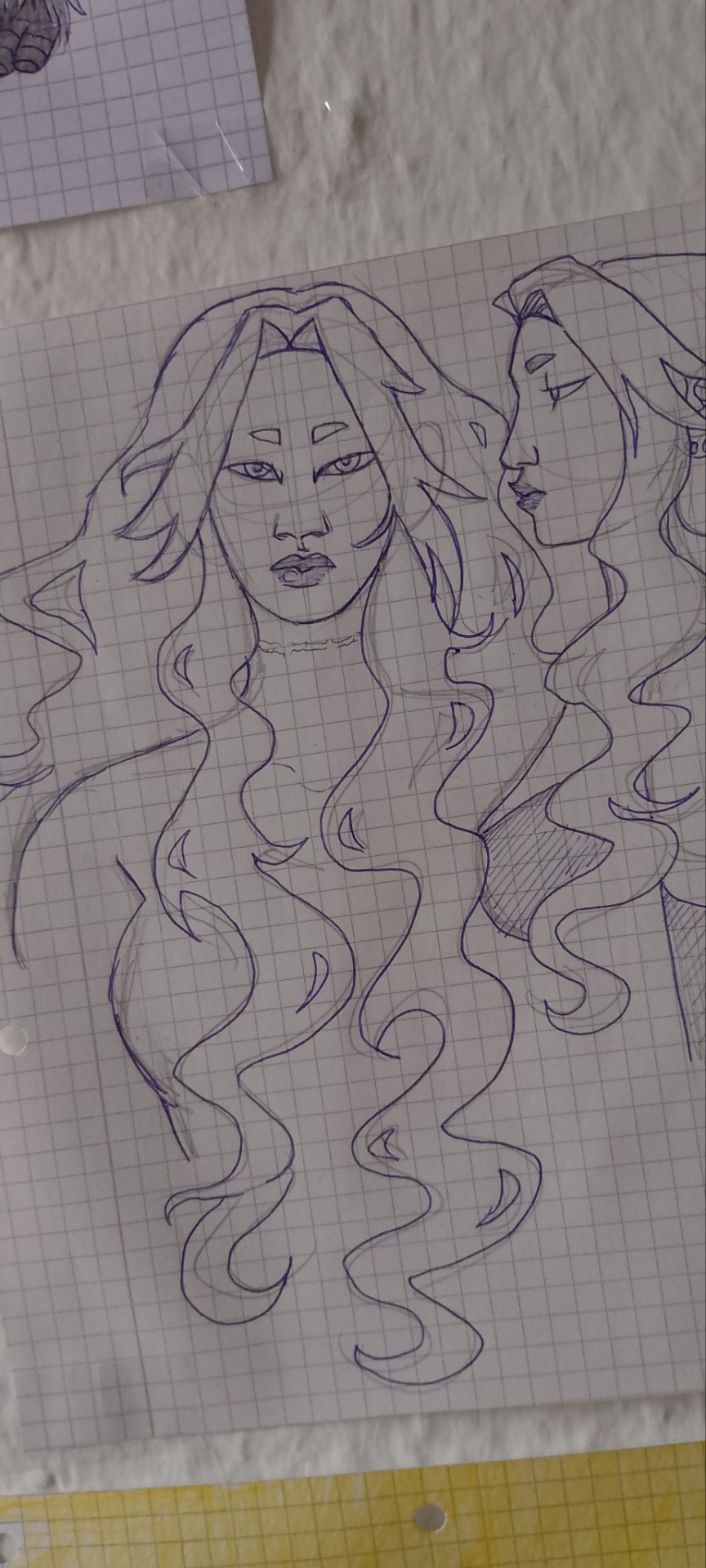
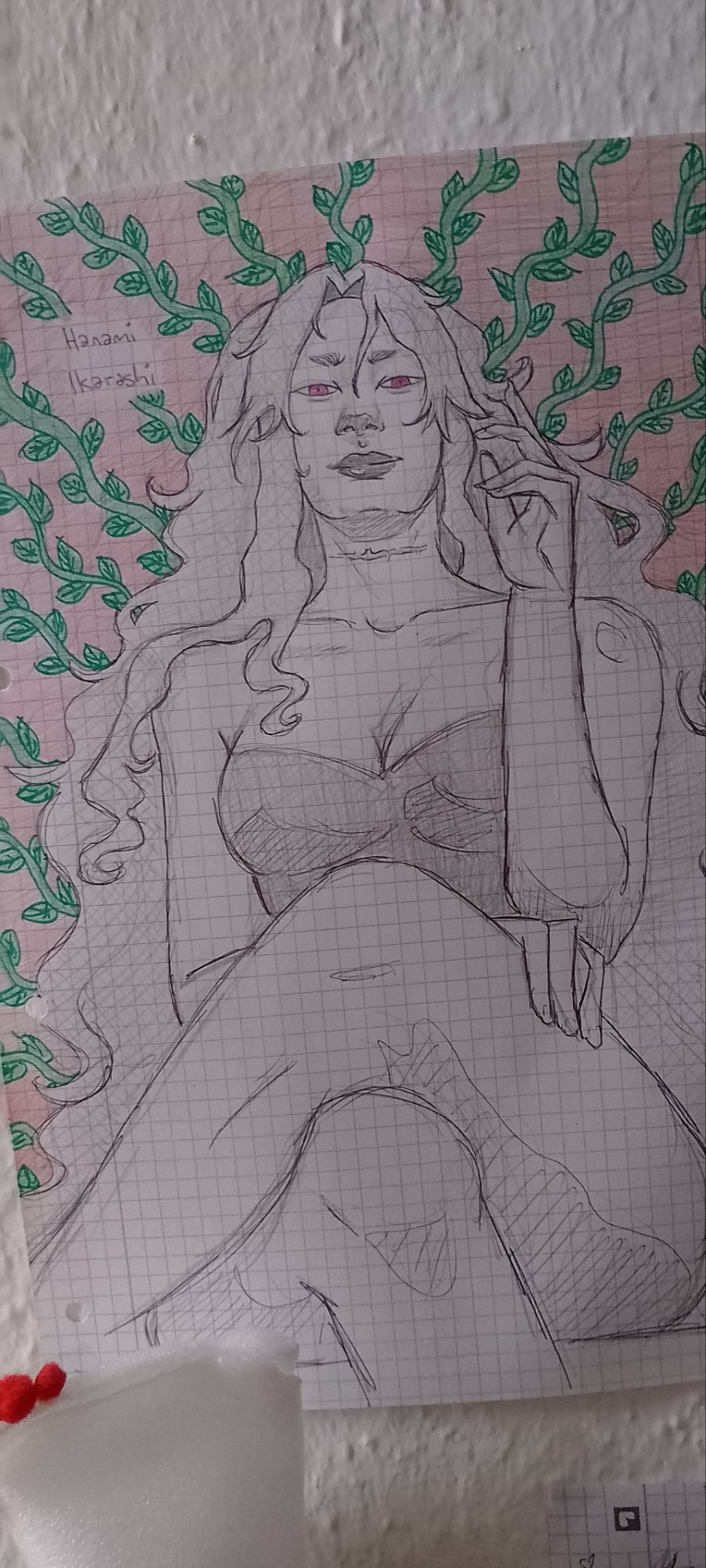
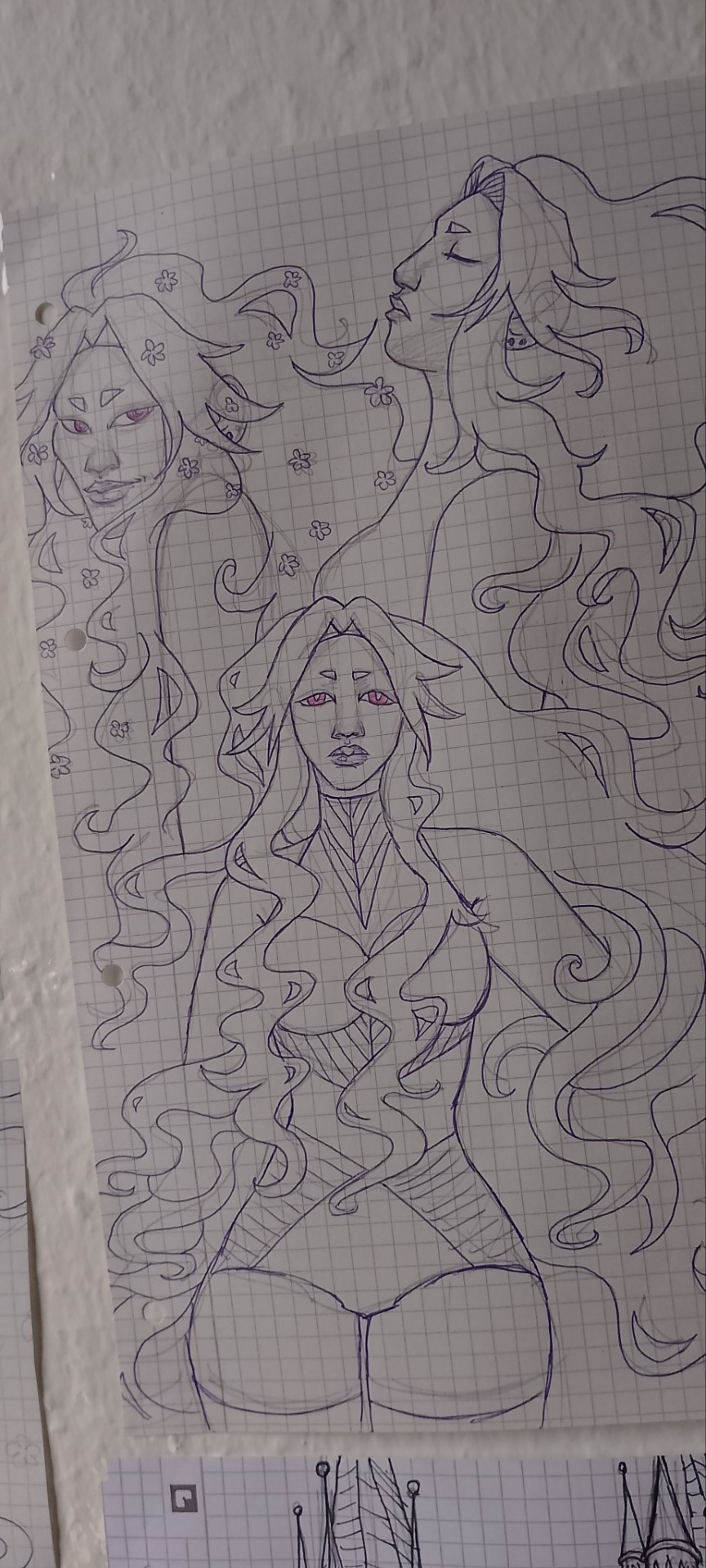
she was actually supposed to be an oc for... my hero academia (yeaahhhh i know i know, pls dont throw tomatoes at me) but now i treat her as just... a random lady made up by me, a lady with a plant based power. her hair is supposed to be like an ash green and her eyes are light pink. i drew a scar on her neck (with an important history, but the history changes depending on my mood lol) cuz... oc's without trauma?
HA!
anyways, that's my main girl.
if you have any questions about me, hanami or anything else, lemme know.
bye bye! <3
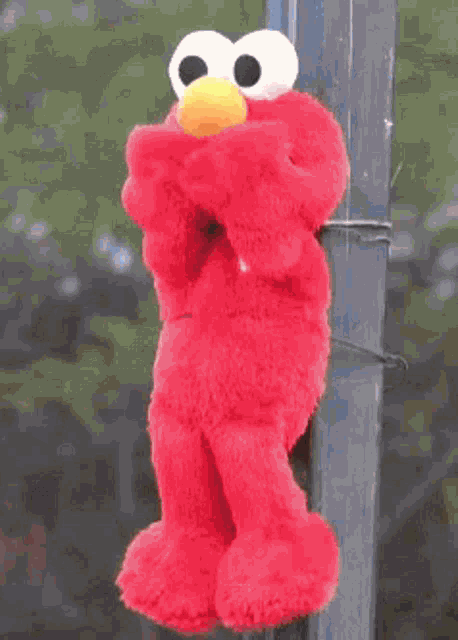
#hanami#ikarashi#oc#oc sketch#hanami ikarashi#idk how to tag this#new account#introduction#introductory post#sillyposting#oc drawing#oc art#oc design#oc doodles#rigby#random#shitpost#personal shit
1 note
·
View note
Note
do you have any sources on the claims you made? im always willing to change my stance if you have legitimate backing for it haha
So first, I’m sorry for blowing up at you the way that I did. I’m not proud that I reacted in such a kneejerk, aggressive fashion. Thank you for being open to hearing what I have to say. I’m sorry for mistaking you for a TERF, and I’m sorry my response has caused other people to direct their own hostility towards you.
So, here’s the thing. “You can’t call bi women femmes” is pretty intrinsically a radfem thing to say, and I am deeply opposed to letting radfems tell me what to do. I’m trying to write this during a weekend packed with childcare and work. I’ll try to hit all the high notes.
The one thing I am having trouble finding is the longass post I talked about in my reply, that was a history of butch/femme relationships in lesbian bars, which had frequent biphobic asides and talked about “the lesbophobic myth of the bi-rejecting lesbian”; the friend who reblogged it without reading it thoroughly has deleted it, and I can’t find it on any of the tags she remembers looking at around that time. If anyone can find it, I’ll put up a link.
As far as possible, I’m linking to really widely accessible sources, because you shouldn’t intrinsically trust a random post on Tumblr as secret privileged knowledge. People have talked about this at length in reputable publications that your local library either has, or can get through interlibrary loan; you can look up any of the people here, read their work, and decide for yourself. This is a narrative of perspectives, and while I obviously have a perspective, many people disagree with me. At the end of the day, the only reason I need for calling bi women femmes is that You Are Not The Boss Of Me. There is no centralized authority on LGBT+ word usage, nor do I think there should be. Hopefully this post will give you a better sense of what the arguments are, and how to evaluate peoples’ claims in the future.
I looked up “butch” and “femme” with my library’s subscription to the Oxford English Dictionary because that’s where you find the most evidence of etymology and early use, and found:
“Femme” is the French word for “woman”. It’s been a loanword in English for about 200 years, and in the late 19th century in America it was just a slangy word for “women”, as in, “There were lots of femmes there for the boys to dance with”
“Butch” has been used in American English to mean a tough, masculine man since the late 19th century; in the 1930s and 1940s it came to apply to a short masculine haircut, and shortly thereafter, a woman who wore such a haircut. It’s still used as a nickname for masculine cis guys–my godfather’s name is Martin, but his family calls him Butch. By the 1960s in Britain, “butch” was slang for the penetrating partner of a pair of gay men.
Butch/femme as a dichotomy for women arose specifically in the American lesbian bar scene around, enh, about the 1940s, to enh, about the 1960s. Closet-keys has a pretty extensive butch/femme history reader. This scene was predominantly working-class women, and many spaces in it were predominantly for women of colour. This was a time when “lesbian” literally meant anyone who identified as a woman, and who was sexually or romantically interested in other women. A lot of the women in these spaces were closeted in the rest of their lives, and outside of their safe spaces, they had to dress normatively, were financially dependent on husbands, etc. Both modern lesbians, and modern bisexual women, can see themselves represented in this historical period.
These spaces cross-pollinated heavily with ball culture and drag culture, and were largely about working-class POC creating spaces where they could explore different gender expressions, gender as a construct and a performance, and engage in a variety of relationships. Butch/femme was a binary, but it worked as well as most binaries to do with sex and gender do, which is to say, it broke down a lot, despite the best efforts of people to enforce it. It became used by people of many different genders and orientations whose common denominator was the need for safety and discretion. “Butch” and “femme” were words with meanings, not owners.
Lesbianism as distinct from bisexuality comes from the second wave of feminism, which began in, enh, the 1960s, until about, enh, maybe the 1980s, maybe never by the way Tumblr is going. “Radical” feminism means not just that this is a new and more exciting form of feminism compared to the early 20th century suffrage movement; as one self-identified radfem professor of mine liked to tell us every single lecture, it shares an etymology with the word “root”, meaning that sex discrimination is at the root of all oppression.
Radical feminism blossomed among college-educated women, which also meant, predominantly white, middle- or upper-class women whose first sexual encounters with women happened at elite all-girls schools or universities. Most of these women broke open the field of “women��s studies” and the leading lights of radical feminism often achieved careers as prominent scholars and tenured professors.
Radical feminism established itself as counter to “The Patriarchy”, and one of the things many early radfems believed was, all men were the enemy. All men perpetuated patriarchy and were damaging to women. So the logical decision was for women to withdraw from men in all manner and circumstances–financially, legally, politically, socially, and sexually. “Political lesbianism” wasn’t united by its sexual desire for women; many of its members were asexual, or heterosexual women who decided to live celibate lives. This was because associating with men in any form was essentially aiding and abetting the enemy.
Look, I’ll just literally quote Wikipedia quoting an influential early lesbian separatist/radical feminist commune: “The Furies recommended that Lesbian Separatists relate “only (with) women who cut their ties to male privilege” and suggest that “as long as women still benefit from heterosexuality, receive its privileges and security, they will at some point have to betray their sisters, especially Lesbian sisters who do not receive those benefits”“
This cross-pollinated with the average experience of WLW undergraduates, who were attending school at a time when women weren’t expected to have academic careers; college for women was primarily seen as a place to meet eligible men to eventually marry. So there were definitely women who had relationships with other women, but then, partly due to the pressure of economic reality and heteronormativity, married men. This led to the phrase LUG, or “lesbian until graduation”, which is the kind of thing that still got flung at me in the 00s as an openly bisexual undergrad. Calling someone a LUG was basically an invitation to fight.
The assumption was that women who marry men when they’re 22, or women who don’t stay in the feminist academic sphere, end up betraying their ideals and failing to have solidarity with their sisters. Which seriously erases the many contributions of bi, het, and ace women to feminism and queer liberation. For one, I want to point to Brenda Howard, the bisexual woman who worked to turn Pride from the spontaneous riots in 1969 to the nationwide organized protests and parades that began in 1970 and continue to this day. She spent the majority of her life to a male partner, but that didn’t diminish her contribution to the LGBT+ community.
Lesbian separatists, and radical feminists, hated Butch/Femme terminology. They felt it was a replication of unnecessarily heteronormative ideals. Butch/femme existed in an LGBT+ context, where gays, lesbians, bisexuals, and transgender people understood themselves to have more in common with each other than with, say, cis feminists who just hated men more than they loved women.
The other main stream of feminist thought at the time was Liberal Feminism, which was like, “What if we can change society without totally rejecting men?” and had prominent figures like Gloria Steinem, who ran Ms magazine. Even today, you’ll hear radfems railing against “libfems” and I’m like, my good women, liberal feminism got replaced thirty years ago. Please update your internal schema of “the enemy”
Lesbian separatism was… plagued by infighting. To maintain a “woman-only” space, they had to kick out trans women (thus, TERFs), women who slept with men (thus, biphobia), women who enjoyed kinky sex or pornography or engaged in sex work (thus, SWERFS) and they really struggled to raise their male children in a way that was… um… anti-oppressive. (I’m biased; I know people who were raised in lesbian separatist communes and did not have great childhoods.) At the same time, they had other members they very much wanted to keep, even though their behaviour deviated from the expected program, so you ended up with spectacles like Andrea Dworkin self-identifying as a lesbian despite being deeply in love with and married to a self-identified gay man for twenty years, despite beng famous for the theory that no woman could ever have consensual sex with a man, because all she could ever do was acquiesce to her own rape.
There’s a reason radical feminism stopped being a major part of the public discourse, and also a reason why it survives today: While its proponents became increasingly obsolete, they were respected scholars and tenured university professors. This meant people like Camille Paglia and Mary Daly, despite their transphobia and racism, were considered important people to read and guaranteed jobs educating young people who had probably just moved into a space where they could meet other LGBT people for the very first time. So a lot of modern LGBT people (including me) were educated by radical feminist professors or assigned radical feminist books to read in class.
The person I want to point to as a great exemplar is Alison Bechdel, a white woman who discovered she was a lesbian in college, was educated in the second-wave feminist tradition, but also identified as a butch and made art about the butch/femme dichotomy’s persistence and fluidity. You can see part of that tension in her comic; she knows the official lesbian establishment frowns on butch/femme divisions, but it’s relevant to her lived experience.
What actually replaced radical feminism was not liberal feminism, but intersectional feminism and the “Third Wave”. Black radical feminists, like Audre Lorde, bell hooks, and Kimberlé Williams Crenshaw, pointed out that many white radical feminists were ignoring race as a possible cause of oppression, and failing to notice how their experiences differed from Black womens’. Which led to a proliferation of feminists talking about other oppressions they faced: Disabled feminists, Latina feminists, queer feminists, working-class feminists. It became clear that even if you eliminated the gender binary from society, there was still a lot of bad shit that you had to unlearn–and also, a lot of oppression that still happened in lesbian separatist spaces.
I’ve talked before about how working in women-only second-wave spaces really destroyed my faith in them and reinforced my belief in intersectional feminism
Meanwhile, back in the broader queer community, “queer” stuck as a label because how people identified was really fluid. Part of it is that you learn by experience, and sometimes the only way to know if something works for you is to try it out, and part of it is that, as society changed, a lot more people became able to take on new identities without as much fear. So for example, you have people like Pat Califia, who identified as a lesbian in the 70s and 80s, found far more in common with gay leather daddies than sex-negative lesbians, and these days identifies as a bisexual trans man.
Another reason radical feminists hate the word “queer”, by the way, is queer theory, which wants to go beyond the concept of men oppressing women, or straights oppressing gays, but to question this entire system we’ve built, of sex, and gender, and orientation. It talks about “queering” things to mean “to deviate from heteronormativity” more than “to be homosexual”. A man who is married to a woman, who stays at home and raises their children while she works, is viewed as “queer” inasmuch as he deviates from heteronormativity, and is discriminated against for it.
So, I love queer theory, but I will agree that it can be infuriating to hear somebody say that as a single (cis het) man he is “queer” in the same way being a trans lesbian of colour is “queer”, and get very upset and precious about being told they’re not actually the same thing. I think that actually, “queer as a slur” originated as the kind of thing you want to scream when listening to too much academic bloviating, like, “This is a slur! Don’t reclaim it if it didn’t originally apply to you! It’s like poor white people trying to call themselves the n-word!” so you should make sure you are speaking about a group actually discriminated against before calling them “queer”. On the other hand, queer theory is where the theory of “toxic masculinity” came from and we realized that we don’t have to eliminate all men from the universe to reduce gender violence; if we actually pay attention to the pressures that make men so shitty, we can reduce or reverse-engineer them and encourage them to be better, less sexist, men.
But since radfems and queer theorists are basically mortal enemies in academia, radical feminists quite welcomed the “queer as a slur” phenomenon as a way to silence and exclude people they wanted silenced and excluded, because frankly until that came along they’ve been losing the culture wars.
This is kind of bad news for lesbians who just want to float off to a happy land of only loving women and not getting sexually harrassed by men. As it turns out, you can’t just turn on your lesbianism and opt out of living in society. Society will follow you wherever you go. If you want to end men saying gross things to lesbians, you can’t just defend lesbianism as meaning “don’t hit on me”; you have to end men saying gross things to all women, including bi and other queer women. And if you do want a lesbian-only space, you either have to accept that you will have to exclude and discriminate against some people, including members of your community whose identities or partners change in the future, or accept that the cost of not being a TERF and a biphobe is putting up with people in your space whose desires don’t always resemble yours.
Good god, this got extensive and I’ve been writing for two hours.
So here’s the other thing.
My girlfriend is a femme bi woman. She’s married to a man.
She’s also married to two women.
And dating a man.
And dating me (a woman).
When you throw monogamy out the window, it becomes EVEN MORE obvious that “being married to a man” does not exclude a woman from participation in the queer community as a queer woman, a woman whose presentation is relevant in WLW contexts. Like, this woman is in more relationships with women at the moment than some lesbians on this site have been in for their entire lives.
You can start out with really clear-cut ideas about “THIS is what my life is gonna be like” but then your best friend’s sexual orientation changes, or your lover starts to transition, and things in real life are so much messier than they look when you’re planning your future. It’s easy to be cruel, exclusionary, or dismissive to people you don’t know; it’s a lot harder when it’s people you have real relationships with.
And my married-to-a-man girlfriend? Uses “butch” and “femme” for reasons very relevant to her queerness and often fairly unique to femme bi women, like, “I was out with my husband and looking pretty femme, so I guess they didn’t clock me as a queer” or “I was the least butch person there, so they didn’t expect me to be the only one who uses power tools.” Being a femme bi woman is a lot about invisibility, which is worth talking about as a queer experience instead of being assumed to exclude us from the queer community.
#cherryhearrts#staranise original#answered asks#ranting in bisexual#lgbt discourse#terf shit#exclusionist shit#radfem shit#apologies to my girlfriend for not including carole queen in this post#she just didn't fit baby
1K notes
·
View notes
Text
Bee Yourself
When viewed from outside, the LGBTQIA+ community, is portrayed as a single, homogenous culture, with a few socially accepted experiences which cisgendered, heterosexual society expects use to conform to. In reality, the LGBTQIA+ community is an umbrella term for a multitude of distinct cultures, united by shared commonalities. This narrow view of what it means to be a part of our community can be extremely damaging to those looking to find themselves.
The Queer Look seeks to explore the identities and experiences of people within the LGBTQIA+ community. To show the many facets that make up a person, and the ways in which we express our identities physically.
The Queer Look aims to show that just because someone does not follow a traditionally accepted path to their identity, and does not conform to all stereotypes associated with that identity, that their experience is not less valid. A gay man who comes out in his forties is no less gay. A Lesbian who has had several boyfriends is no less a lesbian. A trans woman who does not want to wear dresses is no less a woman. And a trans man who refuses top surgery is no less a man.
We are here. We are queer. And we are as unique and distinct as the colours on our flags.
p.s. True to form, I was so excited about the first interview/photoshoot that I forgot to set up the recording equipment. Luckily, Bee took the time to answer a questionnaire that I sent after the fact, hoping to recapture the questions and answers received on the day.
Preferred Name: Bee
Age: 21
Location: Lewisham
Occupation/field of study etc: Receptionist, Arts - History/Gender Studies
Sexual Orientation: Bisexual
Gender: Non Binary
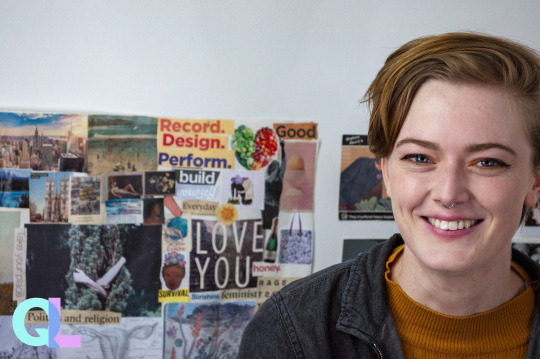
How would you dress yourself on an average day?
On the day-to-day I pretty much have a uniform! You will always find me in high waisted jeans, a white graphic tee and maroon Doc Martens. Some days I wear a binder but some days I don’t, depending on my dysphoria and level of laziness… I also always have colourful socks on because even if you can’t see them in my Docs I still love them.
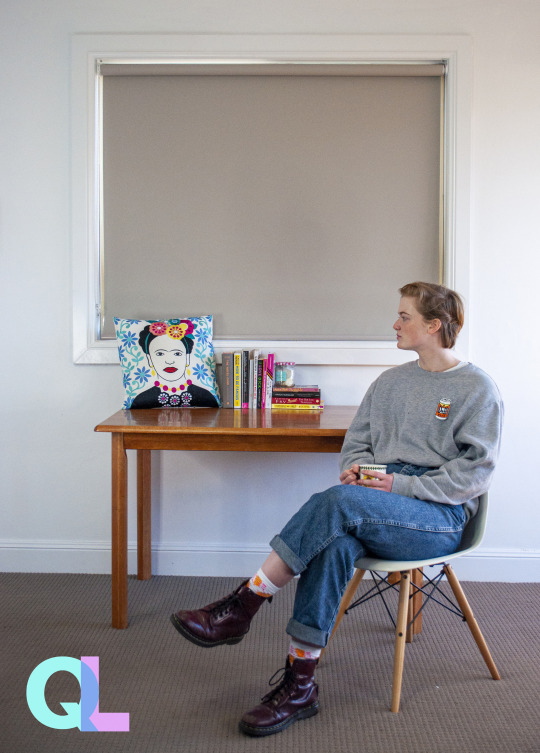
At what point did you realise that you were Bisexual?
I think I properly realised when I was at college in university. I was sitting at the dining table with a friend and we were going through my tinder which had all genders selected (although tinder was still pretty binary then…) and we were both commenting on how hot we thought everyone was. Another friend came and joined us and asked what we were doing, to which we of course answered: “oh we’re just looking at hot girls on tinder”. I asked her what she thought of the girl we were currently looking at and she said “oh no I’m not into women” I ended up asking her again because I couldn’t quite wrap my head around what she meant… and in response she said “I’m not really attracted to her because I’m straight.” I think at that point I was like, oh…. I thought everyone was just attracted to everyone??? Which in retrospect I can only eyeroll a bit at my poor baby self… because it really did take me way to long to put it all together… So even though that was the exact moment, I think that was more like the moment I discovered the label applied to me rather than the moment I realised.

At what point did you realise that you were Non-Binary?
I think it was probably a similar experience to discovering I was bisexual. I realised over a year ago now when I was in USYD Queer Revue in 2018. Being around a community of trans people was something I’d never had before and listening to everyone talk about gender and how they felt made me realise that I had a lot of the same feelings… I bought a binder during the show and trying it on I just felt so like myself? I still sometimes feel insecure that I don’t have the classic narrative of knowing I was non-binary since I was a child, because it’s the narrative a lot of mainstream media likes to use for transness. But I think I needed the time to be experiment with femininity before I finally was able to put a name to how uncomfortable I’d been with it for most of my life. I think realising I was non-binary was a lot of putting pieces together rather than a moment of instant clarity. But I’m glad it took me awhile to experiment and figure out what identity fit me.
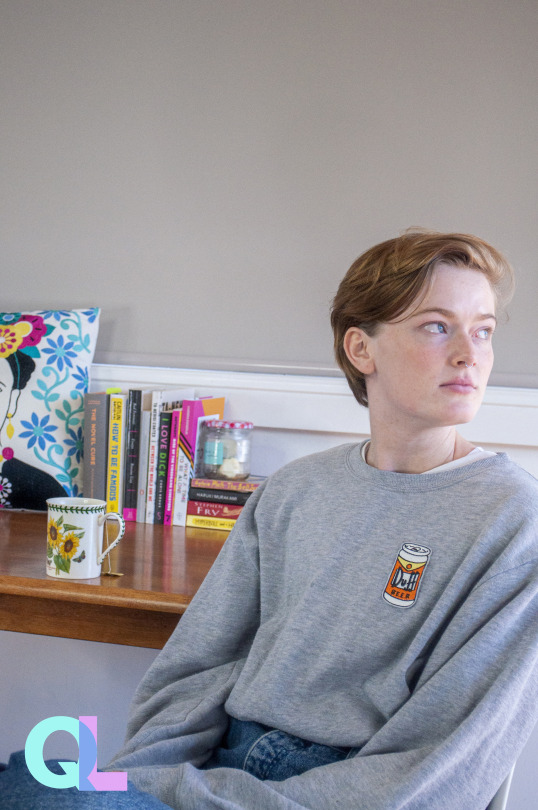
Have you noticed a distinct change in the way you present yourself from before these realisations to after? How has this changed since?
Definitely!!! I guess the first thing is that I stopped wearing things that make me uncomfortable! When I first came out I tried so hard to fit into the “traditional” narrative of being non-binary, which for afab non-binary people boils down to “if you’re not masc you’re not non-binary”. I wore my binder constantly, I lovvvved button ups and I wore a lot of low-waisted pants and baggy jumpers. After awhile I realised that it didn’t make me as happy as I thought it would, because even though I wasn’t being forced to perform femininity, I was still performing my gender. Now I think what I wear lies somewhere in the middle of what I used to wear before and after coming out. Before I came out I definitely tried as hard as I could to be the “perfect woman”. Lots of femme cut tops, dresses, skirts, heels (which god I hate wearing… just like so much…) and make-up. I still have a few of the clothing pieces I wore back then, but almost all of my wardrobe is completely different. I still wear elements now of what I used to wear – I have always been a jeans and graphic t-shirt person - but I now style them in very different ways.
I’ve also started to reclaim some of the things I vehemently rejected when I was in my masc phase. When I first came out I vowed I would never wear make-up again. But now I’ve come to love wearing make-up as a form of expression when I’m going out or to a party. I still feel pretty dysphoric wearing it day to day, but wearing colourful and bold make-up is something I’ve come to love again. I’ll also very occasionally wear a dress if I feel like it, but I tend to just wear the things that make me comfortable. Now basically all I wear is high-waisted jeans, they don’t give me a very masculine silhouette but when I see myself in photos or in the mirror I look like myself. I joke a lot that I wear a lot of dad fashion, and I think that’s maybe what I’ve become most comfortable in, knowing that people are probably still going to read me as a woman no matter what I wear (thank you heteronormativity…) so I may as well wear what makes me happy and for me that’s feeling like a fancy ass dad.

Do you believe that there is any weight to stereotypes about the way people dress based on their sexuality/gender? e.g. bi people tuck in their shirts, lesbians wear flannel etc. Do you believe that there are inherent differences in the way that lgbt+ people present themselves that make them more visible to other members of the community?
Oh god as someone who adheres to all the stereotypes (eep) this is a hard question! But yes, I think so. I think it really depends on the generation and identity. But I think a lot of people do wear things to make ourselves visible to each other. Whether that’s subtle things like adhering to stereotypes or more overt things like wearing activist or identity shirts.
But a lot of it just comes from LGBT+ culture. There’s an obvious style, way of talking, relating, and expression that LGBT+ people have developed historically and that almost all of us continue to participate in. I think a lot of it comes from musicians, particularly drag or music videos, historical figures like Bowie but now from lots of different singers like Janelle Monáe, Troye Sivan, Kim Petras, King Princess etc etc. I think stereotypes have developed because our culture is so prevalent, and most LGBT+ people adopt stereotypes unconsciously because we surround ourselves with people who express themselves in certain ways and are inspired by them. So, while sometimes we actively try to become visible to each other, I think it’s more that we’re all just hopelessly and lovingly enthralled in our own culture.
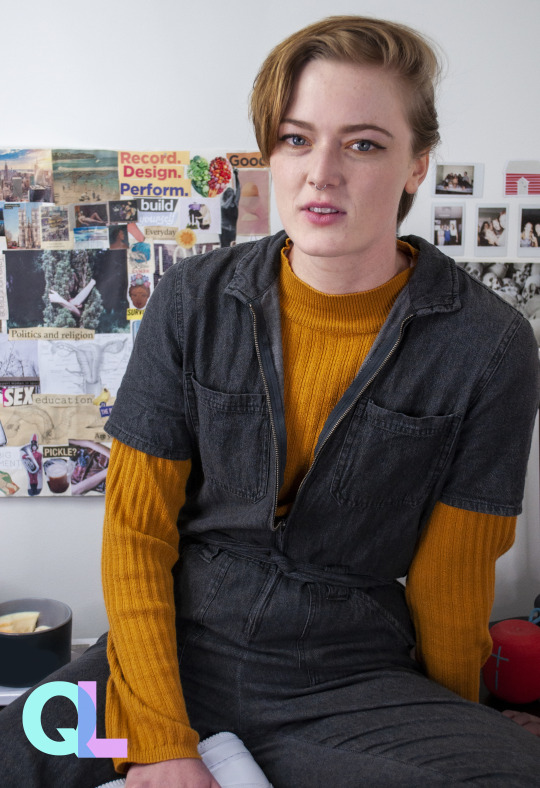
Do you feel that a lack of lgbt+ representation in media contributes to a more narrow, shared understanding of lgbt+ fashion, when compared to cis/het counterparts?
Oh god yes. Yes yes yes. Coming out as non-binary I think a lack of representation was so much of what contributed to me struggling with my identity. Before I came out I knew only ONE famous non-binary person… Ash Hardell I’m looking at you. While knowing about Ash was really helpful to me and representation of any form of expression is so important, the overwhelming narrative for afab non-binary people is that if you’re not masc presenting you’re not non-binary. For awhile that meant I tried so so hard to validate my identity by presenting as masculine as I possibly could. I cut my hair, I wore a binder every damn day, I wore joggers and button-ups, I wore hoodies constantly (because apparently to me that was the height of masculinity??). But after doing that for awhile, I realised I was just as unhappy eradicating every ounce of femininity from myself as I was when it was all I expressed. I think going through that process of experimentation was really important for me to realise that instead of trying to fit into what cis/het culture expected non-binary people to look like, I needed to just be myself first and wear what I love and want to wear and know myself that being non-binary is still part of who I am. And a HUGE part of that process was also finding femme presenting non-binary people, especially afab femme enbies. For me it helped enormously in accepting my body and realising that I didn’t have to hate it as violently as I was because it didn’t fit into the definition it was supposed to. Finding people like Dorian Electra (omg please do yourself a favour and look them up they are the epitomy of my gender), Alok Vaid-Menon, Tillett Wright, Sasha Velour etc etc made me realise that there are more ways to be non-binary than just one. Which is what is so damaging about having less representation – it only validates one path, so either you have to bush-bash yourself a new one (which is insanely tiring, emotionally exhaustive and scary) or you have to squeeze yourself into the one path that is provided for you to claim validity. Honestly, I could go on and on about representation but yes it’s so goddamn important. So Mark Zuckerberg and inc. if you’re reading this like I know you are FIX IT YOU HAVE SO MUCH MONEY PLEASE FOR THE LOVE OF GOD FIX IT.
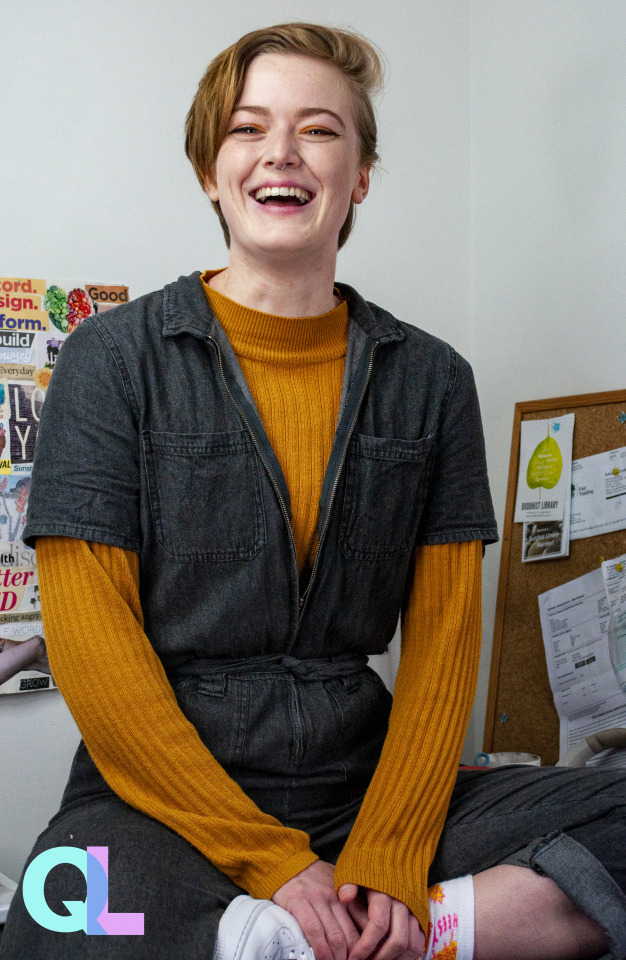
When you are in an exclusively lgbt+ setting, do you feel pressured to “play up” your queerness? If so, does this heightened queer exterior feel more true to yourself?
Yes, I think there are still definitely elements of performance to being in a queer space. Sometimes they can be negative, which generally come from the part of me that is still insecure about my identity and worried about how valid I am. I think a lot of queer spaces still hold at their core a performance of queerness that can be a bit exhausting? As cliché as it is, watching Hannah Gadsby’s Nannettereally helped me understand that. Because part of being queer is finding ways to survive, and so much of queer culture revolves around making jokes about our experiences that sometimes are so limiting in how they allow us to exist. We are all just so starved of space to talk about queerness, that when we can I think we all tend to fall into the trap of performing our identities as much as humanly possible. I’m really curious about how other queer people feel about it, but I think for me there is definitely an element of performance that I still struggle with a little. However, I am still so indebted and so in love with queer spaces and queer people. I always feel so at ease being around people who share a way of thinking. And I mean hey, I’m queer, performing is in my blood.
Find all images from the interviews on facebook: facebook.com/thequeerlook
follow us on instagram at: @thequeerlook
#thequeerlook#queerlook#the queer look#queer#bi#bisexual#bivisibility#lgbt#lgbtqia#lgbtqiaplus#nonbinary#non binary#pride#gay#pan#photography#portrait#portrait photography#identity#interview
11 notes
·
View notes
Note
that bi post is interesting- i guess i have a third pov tho. ive seen some people use bi in a "new" way, to mean stuff like "attracted to women and nb people", "to men and nb people" or "attracted to several genders but not necessarily all" and so on, but also to mean, yeah, pan. and ngl thats cool. i think bi's pretty much a neat catchall for multisexuals of all kind, a bit like how queer is a catchall for anyone not cis or straight, and historically bi even used to group ace people too.
i reread your tags three times and actually it seems that we agree- i guess im just tempted to say that while everyone agrees on the meaning of pan, some people however use it differently to reflect their experience better. but unlike most people i dont view it as a bad thing but way more as something great because people can talk about their experience without feeling bound by, well, limits and definitions and blah i guess ? and as a trans person i find this great and important, not transphobic
Hello there,
thank you for sharing your pov.
I mean, the “new” way sure has a lot to do with “in which country you live”. Here, where I live, people is not using bi-pan in any new different way. But I've seen/read certain strange uses online. [the funniest use and also the only one that annoyed me was, time ago, when some weird straight people started to say: “I'm bisexual, but I only like men/women”.... like... what? How that bisexuality works? XD, but anyway, I'm nobody to go as a gender/sexuality police. Pft, I can't even speak English properly in a discussion. xD]. Also, years ago, some weird people started to say that pansexuality included trans people, while bisexuality no, so they kind of enforced the concept that “bisexuality ” had a transphobic root in its own... which is stupid, since statistics shows that trans people has quite more chances to be in a relationship with a bi/pan partner than a gay/hetero one... so.... soooooo......really crazy the way people spread misinformation.
The meaning of the tags... well... it's long: I can't be anything else but chill about the enormous amount of words that LGBT community has crafted along these last years, because sure, we all want to have the exact right word for us, to condense all our complexity in a single word XD. But let's be honest, no way that would happen, ever. So, until people “discovered” [or more like accepted] that gender and sexuality are a spectrum and are more complex than 3 or 4 words, we developed a lot of words along the way, and made use of the same word with several different uses, making of this world a more complex one [because we are never satisfied with our own :P]. And I'm not even counting on the fact of those “re-appropriated” words that were a slur previously, back in time, such as queer. Those words are a whole lot of mess.
Two simple examples:
A friend of mine at work is a bisexual woman [happily married with her wife
Another case: I, for example, feel super weird with labels. I'm nb, I give a fuck to any word of any gender. But I live in a Spanish speaking country and.... the HELL with the strongly gendered languages... I keep jumping from masculine to feminine or using the “new” neutral forms with -e [that all puritans hate and fight me for that]. But still yet, I keep using the word gay [in English, because at least it's more neutral than any other], because for the world, I'm a gender that can't be hidden once I speak [you know, damn voice] and I kind of be attracted to people of the “same” gender that everyone attaches to me [I said it in that way, because I'm more like a demy-gay, but forget to use demisexual here, nobody knows shit XD]. So... the obvious, shortest way, and efficient way to get rid of that problem every time I have to deal with that [aka, some person asks me with a reasonable argument that doesnt make me to toss them away], it's the word gay. But again, not even that means what it usually means, in my case. But again, imagine explaining all this shit, all the time, every time someone asks me with good reasons?. No way, I'll get bored of all that jabber.
So, these 2 single examples are to explain that... well, LGBT identity words, today, are a mess. Especially if you start adding those trans-masculine and trans-feminine and a lot of extra adjectives.... to me it's more confusing to understand what that person truly is, but what it's clear with that is that such person has a complex identity that wants to be acknowledged. So, if I know this, and if it's relevant for some valid [aka non-creepy] reason, I would ask to understand exactly the shade they mean, so I can acknowledge them properly. Because every gender and sexuality is a mess by its own. We will never get one single word that can embrace it wholly. I know some lucky people got it, they are gay, and cis, or trans and hetero and they are super fine with that...and I'm happy for them, they don't need extra explanations for describe their genders and sexualities xD.
That's why my tags were like that. Pansexuality appeared some decades ago [it's a super young word], specially in countries that are not USA [which it is the country that everything usually revolts around, here in tumblr]. Pan is a super new word, that mostly young people would be more inclined to use. It's more meaningful for young people [maybe. This is not a must. More like an average estimation.]
It's like queer. The oldest LGBT people, with USA-background, will probably hate it to use it. They attached to that word a slur shade that pierced their lives, it's too harmful even to use as a re-appropriated word. Yet, young people love it. Specially people without usa-background. Some of them can't even fathom the hard history meaning behind it.
Well, queer word, outside the history, is a whole mess in its own XD. What does a person mean when they say that they are queer? Are they gay? Are they trans? Are they nb? . Nobody knows. And it's ok, the clear meaning in that word is “look, I'm not cis and/or hetero”. And that's the way it works. I like to use it sometimes too, now that it has been popularised in the South hemisphere thanks to the influences of Butler.
So, yeah, we agreed, anon. XDI tried to say the same as you in my messy tags. I wrote that because sometimes I find such a nerdrage about the **chastity** or the **purity** of languages with this mess of words, or the annoyance of people that don't know the 52 labels at our disposal to describe the LGBT experience. And I simply say that it's okay not to know all of that, and not to force or stress into picking one, because most probably, you will not get it completely explained in one single word, since words, despite being 52, are limited, and sexuality and gender is a whole mess with flavours, colours and shits, that—even worse—may change with time xD.
So... the most mature attitude I think someone can take about this mess is to relax about those labels, pick the ones they think fits better for them, and understand that everyone has their own gender/sexuality, and that label may not suffice, so, when it's relevant, it's ALWAYS important to speak honestly. Yeah, all this textwall could never enter into the tags. xD.
3 notes
·
View notes
Text
The Memory Remains/Carthago Delenda
On the whole, I think I really liked this episode? It certainly felt very old school, in the best possible sense. There were a couple of moments I was actually worried, and considering that I know perfectly well both Sam and Dean will always be fine, that’s quite something.
I sort of liked the mythology, and I liked the class thing, and as for Dean hooking up with a waitress - look, first - this is the writer who practically wrote Dean as bi in Beyond the Mat, his only other Supernatural episode. I know they didn’t quite go there, but by paralleling a young Sam jerking off to some picture of Rio (sorry to be coarse, but that’s exactly what it was and it was confirmed both by dialogue and by Sam’s embarrassed stammering) with Dean’s obsession for Gunnar, well, kudos for the effort. And Jensen, of course, went with it, like he always does, and made the whole thing very obvious. So there’s that, and second - this is what Dean does. He’s a kisser and a hugger and all about touching and be touched, and sex with strangers was the only thing that, growing up, gave him that physical intimacy he craved and nobody else was capable to share with him. We know Mary was dead, of course, and John was not the hugging type, and Sam - my headcanon (which I use liberally in my fics, and sue me) is that he was an expansive child and Dean secretly loved it, but at some point John told both of them to just cut it out already, ‘cause you’re too old for this shit now. So that was that, and from then on, touch that actually matters has been in short supply for Dean - and, unlike Sam, whom I read as more reserved, Dean craves to be touched and held. It’s just who he is. So, whatever - he’s worried sick about Cas, and that’s not going anywhere anytime soon, and there’s a million other things going through his head and now that stupid sheriff’s brought half of them up again by talking about a kid who grew up with an abusive father as though that’s nothing and what can you do (I actually went back and looked three times at that scene, at how the sheriff says, “Guess who gets to take care of him?” because something was bugging me and yeah, there it was - Sam visibly makes an effort to react to the conversation because it’s what’s expected from him, but Dean just looks up - up and to the left, that is, which is what happens when you remember past experiences; and I don’t want this person who reads a lot into every detail, but these are basic biology things an actor would do without even realizing, and also it’s beyond canon, by this point, that Dean took care of John more than once, because that’s what happens when you’ve got an alcoholic parent) - and, sorry, here’s the end of the sentence - it looks perfectly reasonable to me that Dean would want some comfort, and I do believe he slept with that woman and that it was great and that it cheered him up a bit in some bittersweet way and what can you do?
Honestly, all that I’m upset about is that the straight stuff is always out in the open and for the queer one you need to stop your video and squint at the scene and the paintings and the colours and yeah, that BS smack on Dean and the waitress could be nothing -

(Also, that girl is not his type at all. She was just there, and she liked him, and, as he’s told us himself, he likes waitresses because they smell like food and it’s not easy to get them - if that doesn’t sound like comfort and a need for validation to you, I don’t know what does.)
Moving away from Destiel-related content, I really liked how seamlessly the different parts of the episode moved into one another. From that woman reading the text of the Fourth Amendment on the radio at the very beginning (the one which makes it illegal to search a house without a warrant or probable cause, that is), to Ketch and his men walking around in Sam and Dean’s lives as they themselves are in the outside world, living them - that was very well done.
Also well done: the whole social commentary on class and money.
Industrial benefactors are sometimes seen as a good thing, because they normally provide houses for their workers and schools for their workers’ kids and therefore create and enrich a whole community, but personally I’ve always hated the concept (which is not as outdated as one would expect, and ew) and I was happy to see our writer didn’t give them an inch. Yes, sure, the town did prosper, but that factory was creepy and unpleasant in itself (even if you eat meat, you gotta admit that the meat industry and meat factories are about as bleak and morally ambiguous as you can get) and, more importantly, it was only held together by human sacrifice. The idea that it could, in fact, be considered acceptable to lose a kid every year so that the rest of the village can get by was never even suggested, and thank God. Instead, the whole episode read like some old-fashioned Quaker or Socialist leaflet: money corrupts (look at our first victim, lured to his death by a backpack full of dollar bills), creates division and resentment (the tale of the two brothers may have read like a bad Dynasty episode, but these things happen every day), generally comes from blood (the entire god story and the sacrifices) and it’s always better to be honest and poor than rich and tainted (I really liked the sheriff, poor guy).
As for the lore itself - I’m slightly less happy with it, mostly because I would expect both Sam and Dean to know perfectly well what a satyr is (and no, they don’t eat human flesh - those were the women who danced with Dionysos, totally different stuff) and because Moloch has been maligned plenty enough, but I did appreciate the casual horror of it all - a starved and tortured god locked in your cellar, people dressing as animals to capture an unwilling sacrifice - very gothic and compelling.
Since we’re now talking about pagan stuff, maybe Sam and Dean’s discussion about their legacy and mortality made sense, but it was still hard to watch. What happened to the wary hope of S11? To the idea it’s not too late to find a partner, perhaps even to have kids? With that mournful discussion and by carving their initials in the Bunker’s table, Sam and Dean have somehow closed the circle. Their story, this is what they seem to think, is not going anywhere, is not leaving any memory behind. The thing was so sweet and sad, I’m actually comforted by the fact this is not the last season, because there it was - the perfect foundation to end this story in a burst of flames. The reminder to their childhood, the belated acknowledgement that it wasn’t, in the end, as bad as it could have been (“Next time you hear me say that our family is messed up, remind me that we could be psycho goat people,” Dean says, and man, now I can’t wait for that confrontation with Mary we know is coming), the quiet acceptance about their importance in history (non-existent), in people’s lives (often significant) and in their own consciences (“We left the world better than we found it, you know.”) - the knowledge that one day they’ll both die, and they’ll be forgotten, and someone else will live in the Bunker, fight on - it was heartbreaking, but also - also, after all these years of anger and torment and hurt, it looks like Sam and Dean are very close to being okay with everything - their family, their jobs, their place in the world, and even each other - and that’s -

- yeah.
We'll eventually fade away, too.
Just in case someone is wondering: Moloch was the god of Carthage, a city which used to be roughly where Tunis is now. At one point, it was Rome’s main rival - mostly because Carthaginians were better educated and smarter and had a longer and richer civilisation behind them - so Rome started a brutal campaign against them which included a few wars and also liberal amounts of bullshit propaganda. What Moloch is generally associated with is child sacrifice, which ties in nicely with our two victims in The Memory Remains, and I’m not saying that never happened at all, but still - it’s very likely it didn’t happen with the alarming frequency described by some of the more vitriolic Roman politicians. Plus, you know - human sacrifice is a thing in every culture, and it makes perfect sense. A human life, and especially a child’s life, is the most precious thing a community has to offer, right up there with other very precious things, like a good stallion or a fertile bull, so when things start to go really bad, you have up up the ante a bit. Gods are not stupid, and no god is going to show up and save your stupid city in exchange for a loaf of bread and two rabbits. That’s just the way it goes, and everyone knows it. Even the Romans used to perform human sacrifices in times of trouble, so they can just shut it (as you can see, since I’m an archaeologist I’m approaching history in a calm, academic fashion, without taking sides, because that would be both unprofessional and pointless).
Oh, and this is a statue of Moloch which was created for some movie and ended up in someone’s garden in New Jersey, because why not.
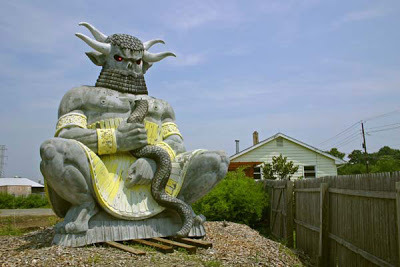
Random thoughts:
I so wish this was on HBO, because Jesus, stoned!Dean must be quite something and that’s clearly something he does, or used to do, a lot and uuugh, where’s my spinoff on those four years he spent without Sam?
Ketch is definitely coded as bisexual - what kind of man notices another man’s hair or clothes? - but at the moment I’m more interested in him stealing Mary’s picture and what he thinks about it.
Which Stark was Sam supposed to be? Who would appeal to him the most? Since Dean was Oberyn, I’m guessing we’re not looking for Tony, but for a random member of the Stark family - Ned, perhaps? Or Bran?
As for Dean picking Oberyn, lol. Bisexual guy who gets into fights to protect his family and is in love with an unpredictable ‘I’m as strong as you and can look after myself, thank you very much’ partner - it’s okay, sweetie, we’ve got you.
If this isn’t going anywhere, Wanek needs to take a chill pill - look at the ships and the puppies and the trench coats and oh my God, that BS sign - what the hell, man?
#spn 12x18#the memory remains#spn meta#destiel#spn and class#moloch#carthage#well#that was quite something#this is going to end so very badly#better stock up on the kleenex#just#please don't kill too many people#and not crowley#and leave the bunker the hell alone#(but yeah)#(that bunker is DOOMED)#(everything is DOOMED)#(*is consumed by flames*)
115 notes
·
View notes
Note
Hey, RoL anon here. I KNOW you're a terrible enabler. I really want to watch Black Sails now, simply because of the gifs you've been reblogging :D I really don't know if i'm going to like it tho, I'm weird about shows. Pro and contra arguments for watching it? Anything I should be aware of? :D
Being a terrible enabler is what I do best, dear anon. :D Black Sails is an amazing show and I can't recommend it enough, but of course I don't know what you like or dislike in shows. I'll list some things that I love about it or that I know other people love about it, and some things that I imagine might be off-putting. Putting this under a cut because it got long:
Pros:
- lots of interesting characters with interesting character dynamics; one thing I especially like is that relationships change over time and characters' actions have consequences - people work together and then betray each other, people fall in and out of love, if one person fucked another one over, the other one will resent them and this will colour their interactions in the future etc.
- morally very grey characters and no protagonist-centric morality: everyone is fucked up, everyone makes mistakes or bad decisions, everyone does awful things for various reasons; nobody is the heroic good guy who's always right; but at the same time all the characters are sympathetic and complex and even when they do horrible things, they have reasons for them
- really great and varied female characters who have their own storylines, their own goals and motivations - a show about pirates could have easily been all men, but instead you have several extremely important, well written female characters who are as central to the story as any of the men
- it's so entertaining: scheming! betrayal! cool fight scenes! pirates! angry arguments! shifting alliances! heartbreak! more scheming!
- the writing is so strong, the story is always engaging and often unpredictable, the dialogues have both humour and incredible badassery
- so many hot people; Flint is obviously the hottest of them all, but the entire cast is smoking hot
- canon m/m and f/f, and not of the token gay character variety: the main character, the badass pirate captain everyone is terrified of, is revealed to be gay well into season two, and several of the main female characters are bi or gay; there are also canon poly relationships; the canon het relationships are well written and believable and not just "this random man and random woman are in love now because we needed an obligatory het romance"
- generally lots of shipping potential, m/m, f/f, m/f, threesomes, cute loving relationships, fucked up violent relationships, sad heartbreaking relationships, complicated relationships with a lot of history - whatever you're into, chances are you'll find a ship that works for you on this show (although, come to think of it, there’s a sad lack of incest potential on this show; the closest you get is a mentor/mentee ship with strong paternal vibes and lots of “he’s like a son to me”)
- it's utterly gorgeous: beautiful sets, costume porn, hair porn, beard porn, and an amazing soundtrack to top it all off
Cons:
- it's very violent, if that's a problem for you
- there's a rape storyline in season 1 that I know some people found hard to watch
- there's a weird asymmetry between the m/m and f/f ships: f/f gets explicit sex scenes, m/m gets a kiss; we get one gay male main character whose romance happens in flashbacks, while three of the four female main characters are bi/gay and their relationships get much more screentime. It's kind of jarring, but at the same time, it's a pirate show that made its badass main character gay and his romance with another man the most life-changing, important event in his life, so it's still more than just about any other show out there has done.
- in the last two seasons, there's one character the show seems a bit too enamoured with for my taste and it hurts the writing, imo, but most of the fandom adores that character, so maybe it's just me
- everyone can die: to me that's a pro because it's one of the only shows out there on which I genuinely never know what's going to happen next, but at times it's really painful to watch when one of your favourite characters murders another character you love ;)
TLDR: it's a great show and definitely worth watching; even its flaws are fairly small compared to most other canons. Unless you have a big problem with violent scenes or don't like canons with morally grey to very dark characters, I'd say give it a try at least. :D
0 notes